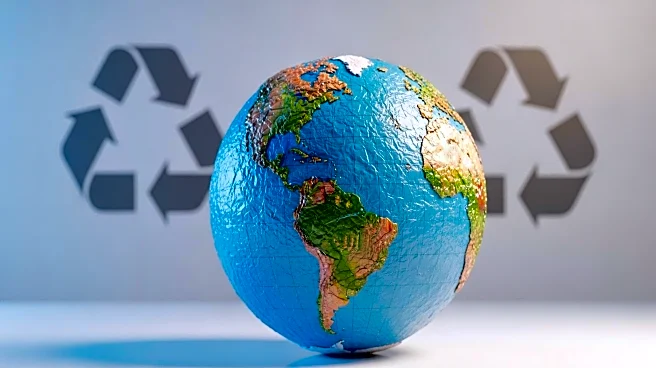What's Happening?
Earth Action For Impact, a Swiss organization, has declared September 5, 2024, as 'Plastic Overshoot Day,' marking the point in the year when global plastic waste production exceeds the capacity to manage it. The organization reports that approximately 225 million tonnes of plastic waste will be generated this year, with only 68% of it being managed effectively. The remaining 72 million tonnes are expected to contribute to pollution through burning, littering, and dumping. The increase in plastic waste is attributed to higher usage of packaging and synthetic textiles. The failure of recent UN-backed negotiations to establish a global plastics treaty has further exacerbated the issue, with significant divides between nations with high plastic production and those advocating for stringent measures.
Why It's Important?
The inability to manage plastic waste effectively poses significant environmental and economic risks. The absence of a global treaty on plastic pollution means increased regulatory pressures and potential litigation for businesses, with projected costs reaching $20 billion in the U.S. by 2030. Companies that proactively address plastic waste management can differentiate themselves and mitigate future liabilities. The ongoing plastic pollution crisis impacts ecosystems and public health, necessitating urgent action from governments and industries to develop sustainable waste management solutions.
What's Next?
Future negotiations for a global plastics treaty are expected, with NGOs advocating for reforms to facilitate stronger agreements. The potential for increased state regulation and litigation against companies highlights the need for businesses to adopt sustainable practices. Companies that invest in reducing plastic risks may gain competitive advantages and build resilience against future environmental and economic challenges.
Beyond the Headlines
The plastic waste crisis underscores the ethical responsibility of nations and corporations to address environmental degradation. The divide between countries with petrochemical interests and those pushing for sustainability reflects broader geopolitical tensions. Long-term shifts in consumer behavior and corporate responsibility are likely as awareness of plastic pollution grows.









